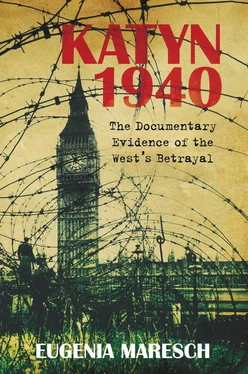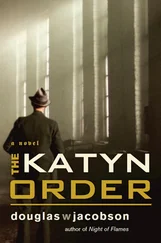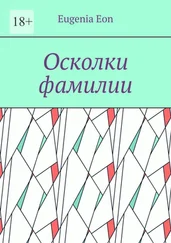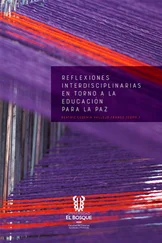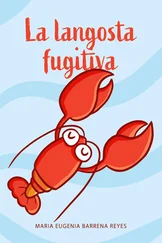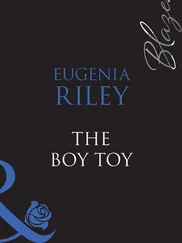With Czapski’s report, which was probably translated at the British Embassy, Mason MacFarlane transmitted his own ‘Most Secret’ observations to Major General Davidson in London, about the missing officers: [21] TNA FO 371/31078 C 1370/19/55 and WO 208/1735A secure signal from Moscow to the DMI, War Office ML 2706, dated 1942 February 3, 12.54 hours; C 1786/19/55, another secure signal ML 2971 dated 1942 February 12 15.46 hours.
There is not the slightest doubt that the NKVD must know what has happened to these Poles as the most detailed nominal rolls and information are kept up at every concentration camp and prison… I am in close touch with Czapski but propose to keep us out entirely of this business, which is a purely Polish-Russian affair…
The NKVD is clearly going back on the categorical assurances given by Stalin to Sikorski. My personal opinion is that nothing short of a personal communication from Sikorski to Stalin will produce results. I send you this only to keep you and COS [Chiefs of Staff] in the picture. The question is a domestic one between the Poles and Russians and I don’t think we ought to get mixed up in it.
The Foreign Office Comments
Others in the Cabinet and Foreign Office quickly picked up this argument. The obstacle lay, amongst other issues, with an unwillingness to help Ambassador Kot, who, while asking Clark Kerr for intervention, was known to have openly criticised the Anglo-Soviet Treaty, which was obviously detrimental to Poland’s future. In consequence, the War Office advised Clark Kerr not to be too accommodating toward the Polish Ambassador. Frank Roberts, head of the Central Department grudgingly gave his support, while others declared that supporting the Poles would not make much difference – except to irritate the Russians. And on top of that, Kot had been talking ‘poisonous stuff’ about the Anglo-Soviet Treaty. Prior to being seen by Anthony Eden, [22] Anthony Robert Eden (1897–1977) Conservative Member of House of Commons 1923–1957; Under Secretary of State at FO 1931–1933, Foreign Secretary in Chamberlain’s Government. Minister for Dominions in 1939; War Minister May 1940; December 1940 to July 1945 Foreign Secretary; in 1945 Co-Chairman of UN Founding Conference in San Francisco; Foreign Secretary again in 1951–5, Prime Minister 1955–1957, resigned, Earl of Avon 1961, Member of the House of Lords.
the Secretary of State for Foreign Affairs and Sir Alexander Cadogan, [23] Alexander Cadogan (1884–1968) Attaché in Istanbul 1909, Third Secretary in the FO in 1910, posted to Vienna in 1913–4, in FO between 1914–1919 as First Secretary, Private Secretary to Permanent Under Secretary of State 1919–1920, Acting Counsellor in FO 1928, KCMG in 1934; Envoy then Plenipotentiary Ambassador to Peking 1934–5, Deputy Under Secretary of State 1936, promoted to Permanent Under Secretary of State 1938–1946; 1946–1950 Permanent Representative to the United Nations Organisation in New York, retired 1950.
the Permanent Under Secretary of State, had the last word: they should not link the two matters but base the refusal on the grounds that the British government could not exert sufficient influence on the Russians. Eden agreed and annotated with his usual red ink: ‘Yes, let Kot see the link, rather than point it out to him.’ On May 1942, Sir William Strang, [24] William Strang (1893–1978) MBE in 1918, Third Secretary in the FO, posted to Belgrade, Second Secretary attached to Anglo-Soviet Conference in 1924, First Secretary in 1925, acting Chargé d’ Affaires, Counsellor in Moscow 1930–1933; knew Serbo-Croat and Russian. CMG in 1932 and CB in 1939, Acting Assistant Under Secretary of State, KCMG in 1943; Joint Permanent Under Secretary of State; Political Advisor to Commander in Chief of British Forces of Occupation in Germany in 1945; General Secretary 1947, appointed Permanent Under Secretary of State 1949.
the Acting Under Secretary of State, Central Department of the FO, sent Ambassador Sir Archibald Clark Kerr an ‘immediate decipher yourself signal’ with just that advice:
I should prefer you not to intervene in this Russo-Polish question. Our intervention might only serve to irritate the Soviet Government. You should base your refusal on this ground and on our inability at present to exert sufficient influence with the Soviet Government but without directly connecting the two questions, you may be able to let your Polish colleague see that he is unlikely to obtain much satisfaction on this issue while he continues to criticise the Anglo-Soviet negotiations so openly. [25] TNA, FO 371/31083 C 4929/19/55 secure signal, 1942 May 12 No. 731, ‘Immediate’ 1942 May 19 12.35 hours from FO to Kuibyshev.
The British, in spite of opportunities to do so, did not raise the matter again, while the Polish government remained unable to elicit the truth from the Russians without British assistance.
Lieutenant Colonel Leslie Hulls’ report
The three reports written for the War Office by British Liaison Officer Lieutenant Colonel Leslie R. Hulls [26] Leslie R. Hulls (N N) Lt Col Gordon Highlanders, RNVR in 1917, Captain in 1920, MC, fought in the Caucasus during the Russian Revolution and knew the language. Commissioned in 1939 by Regular Army Emergency. Temporary Major in February 1941, Acting Lt Col in July 1941 as a Liaison Officer to General Anders with the Polish forces in Russia and Iraq. Accused of having too much influence over Anders, General Sikorski requested his relief in April 1943, but later retracted his charges. Hulls was not allowed to return to his post. In July 1943 Hulls was temporarily seconded to the Allied Liaison Directorate of the War Office and took a Civil Affairs course. In March 1944, he was still involved with evacuation of refugees including Poles. His superior Lt Gen F. G. Beaumont Nesbitt of the DMI considered him best qualified for the job.
have survived. The first, dated 18 June 1942, was sent from Yangi-Yul, a place near Tashkent, the HQ of the Polish Army in Uzbekistan. The other two came from Quisil Ribat, dated 29 October and 3 December 1942. Hulls had witnessed the miserable condition of the Polish Army and pleaded with the British military authorities to put pressure upon Stalin to adhere to the agreement and release the rest of the missing officers.
Hulls must have written a number of reports to the Military Intelligence Department of the War Office. The follow-up briefs indicate that Hulls’ personal experience and knowledge of the Russians were ignored. The subject of his report of 3 December 1942 can be verified by the Soviet documents released between 1992 and 1997 to the Polish Committee of Military Archivists in Warsaw. [27] TNA FO 371/97632 AU 1661/26, three typed copies of confidential reports written by Lt Col Hulls and sent via Military Attaché in Cairo to the War Office, dated Yangi-Jul 18 June 1942, the other two came from Qisil Rabat 29 October 1942 and 3 December 1942. Yangi-Jul copy with slight variations is also in WO 208/1735A C11048/152/G; Hulls’ reports were accurate and can easily be compared with the Russian documents of the time, acquired from the State Archives by the Polish Committee of historians and archivists of the CAW Central Military Archives in Warsaw between 1992 and 1997. Kol. WKA ( Wojskowa Komisja Archiwalna – Military Archives Committee) Syg. VIII.800.26/ 1 to 12.
Hulls’ verbatim reports are difficult to follow owing to their peculiar grammatical structure. In the interest of clarity some of his grammar and vocabulary has been amended; but the tone and factual content has not.
Polish Soviet Relations
The Soviet note to the Polish Government dated 31.X.1942 regarding the military agreement and the refusal of the Soviet Government of a further recruitment in Russia.
Читать дальше
